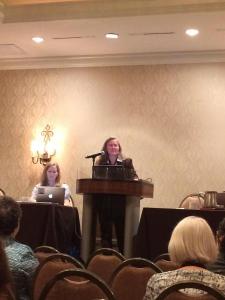By Aylin Y. Woodward
The highly anticipated, and potentially contentious, business meeting at ScienceWriters2016 is over, and members of the NASW — all 2,534 of them — are breathing a collective sigh of relief following a respectful and informative discussion.
Newly elected NASW President Laura Helmuth kicked off the meeting by bidding farewell to seven outgoing board members, and welcoming eight new board members. That was followed by committee updates:
- Diversity: Created and approved funds for an NASW minority fellowship that will support two early career journalists;
- Freelance: Updated NASW’s ‘All About Freelancing’ page to make it more accessible and relevant while also organizing the ScienceWriters2016 pitch slam;
- Fairness: Created a new website with information about issues of representation and harassment in employment;
- PIO: Funds were approved for an NASW-supported workshop in Seattle this spring and the committee is working on a possible new award for excellence in institutional science writing;
- Programs: Whittled down 66 proposed sessions to the 14 that made the Sciencewriters2016 schedule;
- Information Access: Created a database where writers can share practical reporting information, and successfully pushed the NASW to sign onto to a letter originating from the Society of Professional Journalists addressing a lack of transparency at the White House;
- Membership: Welcomed 385 new members into the fold and only had to reject nine applications from social workers.
The Ideas Grant Committee also announced the renaming of the ideas grants in honor of Peggy Girshman, a dedicated volunteer and member of NASW, who passed away in March. “Peggy in her quiet, funny and adversarial way got things done. She was such a warm and loving person, and a champion of all we do,” said former NASW president Nancy Shute. Peggy’s self-written eulogy can be found on the NPR website.
Treasurer Rob Frederick then took the mic and spoke to current financial challenges stemming from the five-figure budget for the upcoming website redesign and the World Conference of Science Journalists coming to San Francisco next October, hosted by UC San Francisco and UC Berkeley. The funds that would have been allocated to ScienceWriters2017 have been directed to WCSJ. The event’s budget is already in the millions, given that science writers from all corners of the globe will look to be in attendance.
Over 320 proposals were submitted for next year’s conference, 130 of them from NASW members — twice the typical number of NASW proposals. Registration opens in May, and Helmuth expects 1,200 people to be in attendance.
Finally Helmuth presented the Diane McGurgan Award, which recognizes volunteer work, to NASW book editor Lynne Lamberg. Kendall Powell, chair of the Freelance Committee, accepted the award on Lynne’s behalf, saying “Lynne worked quietly behind the scenes, and does incredible things for the organization that people might not know about.”
NASW members also voted on two proposed constitutional amendments at the meeting. The first would keep the organization abreast of changes in New York state guidelines for non-profit organizations. The second amendment, widely debated, would allow those whose primary activity is not journalism to serve as president, vice president, treasurer or secretary, which is not currently permitted by the NASW constitution.
These amendments require at least a 50% majority of regular voting members to pass. Paper ballots were distributed at the business meeting, and members delivered their votes to cardboard ballot boxes held by NASW student members. While not allowed to vote, students participated in the voting process by helping NASW Executive Director Tinsley Davis count ballots on Sunday.
Absentee ballots and proxy votes will also be tabulated, and results of the amendment vote will be available in one week, according to Helmuth.
“We explored the issue very thoroughly in a short amount of time,” Helmuth said. “It was very civil; I thought we hit the highlights and offered enough explanation for people who are new to NASW.”
Members were allowed half an hour of discussion time about these constitutional changes. Flurries of 30-second comments and ideas punctuated a civil, and admittedly perfunctory, dialogue about the issue. Rick Borchelt, the primary driver of the petition behind the PIO amendment, thinks that the enthusiasm for getting this changed is high and that reasonable people can differ on what it takes to change it.
Borchelt, who sported a coonskin cap, remains optimistic about the future of NASW. “The state of the union is strong; we’re a close knit community and nothing we do or say is going to destroy that fellowship and camaraderie,” he said.
See you all next October in San Francisco!

